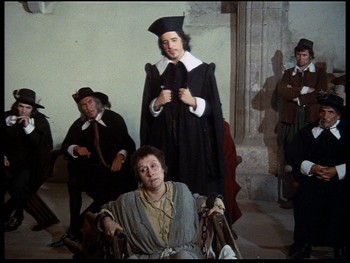...
Among Rossellini's strangest, most austere films. Why? He chose a subject of irreducibly french character, the inimitable proto-modernist, Blaise Pascal, and decided to study for it by watching those french films that moved him most. So he did: he watched Bresson, and for camera style, probably a little Dreyer. (Indeed it is unavoidable to watch Bresson without seeing Dreyer's influence as well.)
...
The soundtrack, doom-ridden. The opening credits bespeak the commencement of a horror film. We are about to engage with a mind that unhappily discovered the substantial spectre of the Void. (Among his many achievements of genius, Pascal seriously took on the problematic existence of the Void, and came to the conclusion - through logical acumen and through mathematical intuition - that the Void must exist; that it is as substantial as the known, treatable & hypothetical substances of the physical world...) So the music, mood, and spirit of the film emanate from this grim, unavoidable discovery...
...
The film is unrepentantly strange. In the first scene we encounter 3 musketeer-chapped men who sit at a well and pour out wine for drink. They all agree, "This is good wine!" I am unsure if this is meant to convey to us that these men are purposefully french, or that they are, despite their unassuming, kindly nature, rather too sensual for the likes of the family who arrive funereally in a carriage the next moment. We are introduced to the family of the austere Etienne Pascal: they do not drink or laze about: they are Godfearing, chaste folk who read scripture and entertain themselves with geometrical conundrums for sport. The father uses his son's mathematical genius for village book-keeping. They are provincial, but learned. In a way, the background of a quiet provincial lifestyle goes a long way to explain Pascal's atmospheric, hermetic genius: his was a devout mind that thrived in the solitude of the countryside, in the seclusion of his room, away from the glamour of Paris, a country-priest fashioned much like Georges Bernanos' tormented hero...
...
Rossellini indulges in the budget allowed him for the set production: we are treated to long takes of scholarly flirtation with minutiae. (For instance, the scene in which the Counsellor is awoken by his servants, then meticulously washed and dressed, reminds us of Dreyer's [and Bresson's] still-frame meditations on manual exercise & routine performances; but the scene also serves to educate on how such domestic affairs were performed, if they were performed at all. A bigger-budgeted film with studio-dictated requirements would have quickly eschewed such deliberately dilatory scenes, since they ostensibly do nothing to further the dramatic impulse.) Other moments come to mind: when Pascal's sister, after he had fallen faint from his chronic ill health, heats her brother's bed very quickly with a device that looks like a heated iron-head rod, to warm his bed before they lift his collapsed body unto it, gives me some warmth too in watching it; the care put into these details delights me precisely because such moments are so tangential and trifling, so concerned with the daily toil and small features of everydayness back then. Television production has rarely done better than give Rossellini the money and time to film such wonderfully informative, charmingly nugatory touches...
...
Humor occurs when we are favored by a fantasy dialogue carried between the lofty and worldly Descartes, and the provincial, youthful, but thoroughly poetic Pascal. Descartes' face when he looks up at us - at the camera - while listening to Pascal's dialectics of the heart's superior reasoning to the vain efforts of pure reason, creates great mirth. If this conversation ever did take place, no doubt Descartes would look like this man, and would look up that way at his colleagues, wryly, amused...
...
Finally, the last scenes remind me of Bresson's Diary of a Country Priest. The young would-be curate suffers almost voluptuously the torments of solitude, the solitude so full of yearning for God that the Almighty becomes more painfully distant. Terrific pan and closeup on Pascal painfully seated by the fireplace, reading one of his final pensees:
Fire. The God of Abraham. The God of Issac. The God of Jacob. Not of the philosophers and intellectuals... the God of Jesus Christ.
Pascal is shown to us as he should always be understood: a poet of devotion and fruitful intuition, for whom science and math were but diversions from the ultimatum of the spirit.
We are induced to believe, probably correctly, that his death was due to the grossly crude and unrefined medical practices of the time, such as when a doctor who comes to visit him prescribes a paste made of mashed dog and worm to coat his calves [!?]; and further: what folly and laughter to hear the medics declare the dying Blaise on his deathbed as "perfectly in good health," though even a fool would see that visibly the moribund Pascal was in his final death throes. The final scene in which Pascal receives the Final Ablution and dies, goes back to Dreyer's religious effect, and reminds us of Bresson's terminal, but achingly aesthetic severity (per his late films). Rossellini's Pascal may not stand for a quintessential Rossellini film, but its skilled mimesis of those pastmasters is enough to warrant our attention, and would perhaps even bring a smile on Bresson's cerebral face.
...

No comments:
Post a Comment